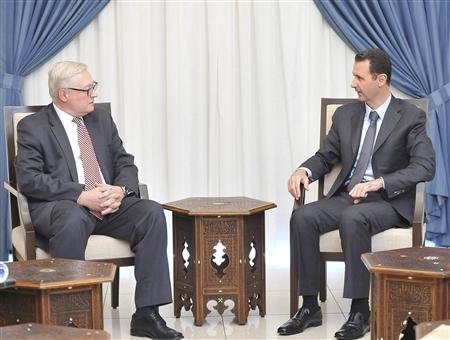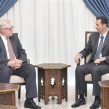
An Uneasy Russo-American Accord on Syrian Chemical Weapons
Publication: Eurasia Daily Monitor Volume: 10 Issue: 166
By:

The agreement between Russia and the United States to destroy the Syrian arsenal of chemical weapons was signed in Geneva last weekend on September 14, after several days of strenuous negotiations between delegations led by Russian Foreign Minister Sergei Lavrov and US Secretary of State John Kerry. But the accord seems to imitate some grand, Cold War–style compromise, in which the officially signed paper implies one thing, while the parties truly intend to achieve something different. The Syrian chemical arsenal is seen in Moscow as a destabilizing factor with questionable military value, being used by the West as a pretext to intervene militarily to alter the balance of forces in the Syrian civil war, which in turn may lead to a victory by radical jihadist opposition forces. Moscow’s primary concern is to secure the future of the present Russia-friendly Syrian regime and help it defeat the opposition using military and diplomatic means. Unlike the Kremlin, President Barack Obama’s administration does not seem to have any clear-cut strategy in Syria. President Bashar al-Assad’s regime is deeply disliked in Washington for its senseless mass butchery of civilians and its close links with Iran. However, the Syrian opposition is distrusted because of the prominence of radical jihadist groups among its ranks. Still, both Moscow and Washington seem to agree, for differing reasons, on one thing: the need to safely eliminate Syrian chemical weapons. And this has turned former bitter opponents into accidental allies; though this partnership is extremely fragile (https://ria.ru/columns/20130918/964027458.html).
Public differences immediately surfaced regarding Russia’s and the United States’ interpretation of the Geneva accord. Using particularly strong language in Moscow on September 16, Lavrov accused Kerry as well as the foreign ministers of France and the United Kingdom of “deliberately misinterpreting the Geneva agreement” by calling for the United Nations Security Council to speedily adopt a resolution threatening the al-Assad regime with punitive action “under Chapter VII of the UN Charter” if Damascus fails to comply with the strict timetable of chemical disarmament that was written into the US-Russian memorandum. Russia adamantly opposes any binding resolution in the UN that contains any language possibly authorizing the future use of force by outside powers. Lavrov expressed “hope” his Western counterparts will “simply read the signed documents” and stop talking in terms of threats of use of force, “or seek pretexts for attacking, which only incites the inflexible opposition to make more provocations” (https://www.mid.ru/brp_4.nsf/newsline/346893817D76B91B44257BE80044A213).
A UN experts’ report, released on September 16, concludes that the sarin gas attack on the rebel-held Damascus suburb of Ghouta on August 21 involved the firing of missiles, apparently from government forces–held territory. However, Russian officials continue to doggedly insist there is “overwhelming evidence” the sarin attack “was a provocation by the opposition forces,” apparently intent on “provoking” a US-led military intervention into the Syrian conflict (https://www.interfax.ru/print.asp?sec=1446&id=329721). The Russian permanent representative to the North Atlantic Treaty Organization (NATO), Alexander Grushko, told journalists that he had informed the NATO-Russia Council “about the fabrication of much of the so-called ‘evidence’ of the use of chemical weapons in Ghouta” (https://www.interfax.ru/txt.asp?sec=1483&id=329662). Deputy Foreign Minister Sergei Ryabkov, who visited Damascus this week to consult with al-Assad, told journalists: “The UN expert opinion [on the use of sarin gas in Ghouta] is politicized, one-sided and prejudiced.” According to Ryabkov, Russia “is disappointed with the attitude of the UN Secretariat and the UN inspectors in Syria.” Ryabkov promised that Moscow will deliver to the UN additional facts implicating the opposition in chemical “provocations” (https://ria.ru/arab_riot/20130918/963877678.html#ixzz2fKOFfY25).
The sarin in the Ghouta attack was apparently delivered by a Soviet-made M14 140-millimeter missile and a 330-mm weapon of unknown origin. Moscow has strongly denied helping to develop or selling the Syrians chemical weapons, while continuing to accuse the rebels of clandestinely producing sarin and improvising the delivery systems, possibly using old Soviet rockets (https://radiovesti.ru/article/show/article_id/106414). Chemical weapons connections between Moscow and Damascus, in fact, seem to have existed. Former Soviet chemical weapons designer Vil Mirzyanov told independent web TV Dojdzh: “Syrian chemical warfare personnel studied in Moscow; Russian instructors worked in Syria; and, in 1989, Moscow sent chemical weapons and delivery systems to Syria and Iraq.” In 1995, a criminal case was opened against Russia’s leading chemical weapons designer and expert General Anatoly Kuntsevich for allegedly supplying Syria with chemical weapons precursors and production know-how. Kuntsevich, who was at the time President Boris Yeltsin’s adviser on chemical and biological weapons, was ousted from the Kremlin, but the criminal investigation was eventually closed. In 2002, Kuntsevich suddenly died of heart attack while on a business trip to Syria (https://tvrain.ru/articles/vil_mirzajanov_razrabotchik_himicheskogo_oruzhija_k_postavkam_zarina_v_siriju_prichastny_pomoschnik_eltsina_kuntsevich_i_byvshij_glava_soveta_federatsii_shumejko-351386/).
Since Russia holds veto power in the UN Security Council and is supported on Syria by China, which also wields a veto, only a Russian-approved resolution on Syrian chemical disarmament that does not contain any reference to punitive action or to “Chapter VII” may pass the UN. Al-Assad will not be reprimanded in any way by the UN Security Council for allegedly using sarin gas against rebels, while Western powers will equally not allow any references to “opposition provocations” in Ghouta—a seemingly Cold War–style deadlock. Still, to actually begin disarming Syria, both sides must work together. According to Ryabkov, al-Assad is prepared to fully cooperate with inspectors from the Organization for the Prohibition of Chemical Weapons (OPCW) and disclose his chemical caches (https://www.kommersant.ru/doc/2282332/). The Russian Ministry of Defense is preparing to send to Syria a contingent of military personnel trained to deal with chemical/biological hazards and spetsnaz forces to guard the specialists and the perimeter of chemical storage facilities. The Russian defense ministry believes some 10,000 foreign military personnel, including contingents from the US and its NATO allies, must be deployed to safely guard and process the Syrian chemical arsenal (https://www.kommersant.ru/doc/2282237/).
Obama may, therefore, be forced into a humiliating position of either having to put US Army boots on Syrian soil together with al-Assad’s Russian allies under the command of some hypothetical Scandinavian general, risking the troops coming into harm’s way or becoming hostages (all this after refusing to remotely use cruise missiles to punish al-Assad), or be left out in the cold without any firsthand knowledge about what is happening with al-Assad’s arsenal. The deployment of a limited contingent of Western troops in Syria would imply a tacit understanding that al-Assad must stay in power to guarantee their safety and a smooth disarmament process. This appears to be the main long-term strategic objective of Moscow and Damascus in the Syrian chemical weapons destruction process.




